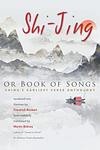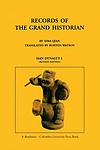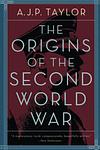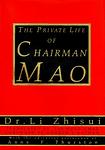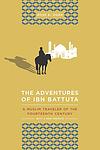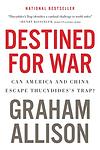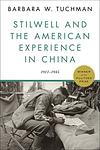The Greatest "History, China" Books of All Time
Click to learn how this list is calculated.
This list represents a comprehensive and trusted collection of the greatest books. Developed through a specialized algorithm, it brings together 300 'best of' book lists to form a definitive guide to the world's most acclaimed books. For those interested in how these books are chosen, additional details can be found on the rankings page.
Genres
The category of "History" in books refers to the study and interpretation of past events, societies, and cultures. It encompasses a wide range of topics, including political, social, economic, and cultural developments, as well as the lives of individuals and groups who have shaped the course of history. History books can be written from various perspectives and may focus on specific time periods, regions, or themes. They aim to provide readers with a deeper understanding of the past and its impact on the present.
The "China" category for books encompasses a wide range of literature that explores the history, culture, politics, and society of China. This includes works of fiction and non-fiction, spanning from ancient times to the present day. Books in this category may delve into topics such as Chinese philosophy, art, cuisine, and language, as well as contemporary issues such as economic development, human rights, and environmental concerns. Overall, the "China" category offers readers a diverse and rich collection of books that provide insight into one of the world's oldest and most complex civilizations.
Countries
Date Range
Reading Statistics
Click the button below to see how many of these books you've read!
Download
If you're interested in downloading this list as a CSV file for use in a spreadsheet application, you can easily do so by clicking the button below. Please note that to ensure a manageable file size and faster download, the CSV will include details for only the first 500 books.
Download-
1. The Second World War by Winston Churchill
This book provides a comprehensive overview of the Second World War from the perspective of one of its most influential leaders. It covers the entire span of the war, from its origins in the political and economic turmoil of the 1930s, to the major battles and strategic decisions that shaped its course, to its aftermath and impact on the world. The author's unique perspective and firsthand experience, combined with his eloquent and insightful writing, make this a definitive account of one of the most important events in modern history.
-
2. Wild Swans: Three Daughters of China by Jung Chang
This book is a biographical account of three generations of women in China, spanning the years 1909 to 1991. The narrative follows the lives of the author's grandmother, a warlord's concubine; her mother, a high-ranking official in the Communist Party; and the author herself, who grew up during the Cultural Revolution before moving to the West. The book presents a vivid portrayal of the political and social changes in China during the 20th century, as seen through the eyes of these three women.
-
3. The Book of Songs by China
"The Book of Songs" is a collection of ancient Chinese poetry, providing a rich cultural and historical insight into early Chinese society. The anthology includes various types of poems, such as folk songs, hymns, and courtly songs, reflecting the life, customs, and beliefs of different social classes. It serves as a significant literary work and historical document, revealing the evolution of the Chinese language, thoughts, and values over centuries.
-
4. The Gate of Heavenly Peace by Jonathan Spence
"The Gate of Heavenly Peace" is a comprehensive historical analysis of China from the 1890s through the 1980s, focusing on the intellectual and political movements that shaped the country. The book explores the complex interplay between tradition and modernity, and the often tumultuous relationship between the Chinese people and their leaders. It delves into the lives and thoughts of key figures in Chinese history, providing a nuanced understanding of the forces that have shaped China's trajectory.
-
5. The Death of Woman Wang MMP by Jonathan Spence
"The Death of Woman Wang MMP" is a historical narrative that vividly portrays 17th-century rural China, specifically the T'an-ch'eng county in Shantung province. The book focuses on the lives of ordinary people, their struggles, and the harsh realities they face, using the tragic story of a woman named Wang as the central narrative. It also provides a detailed account of the local judicial system and the role of the local historian, all of which are interwoven to create a comprehensive picture of the society and culture of the era.
-
6. Records of the Grand Historian by Sima Qian
"Records of the Grand Historian" is an ancient Chinese text that provides a comprehensive history of China, from the earliest times up to the author's own period. The book is divided into five parts: the Basic Annals, the Chronological Tables, the Treatises, the Hereditary Houses, and the Biographies. It covers the lives of significant figures, political events, cultural developments, and much more. The author's objective and critical approach to history has had a profound influence on Chinese historiography and continues to be a valuable resource for understanding ancient Chinese history and culture.
-
7. In Xanadu by William Dalrymple
"In Xanadu" is a travelogue that follows the journey of a young historian and writer as he retraces Marco Polo's route from Jerusalem to the fabled city of Xanadu in Mongolia. Along the way, the author weaves together a rich tapestry of history and adventure, engaging with diverse cultures and landscapes. His travels take him through the Middle East, South Asia, and into the heart of China, offering insights into the complex interplay between past and present, and the enduring allure of one of history's most legendary journeys. The narrative is as much a personal coming-of-age story as it is a homage to the spirit of exploration and discovery.
-
8. A Comparative Study Of Total Power by Karl Wittfogel
The book in question is a scholarly examination of the concept of 'hydraulic civilization,' a term used to describe societies that manage large-scale water projects such as irrigation and flood control. The author argues that the bureaucratic structures necessary to control water resources in arid regions historically led to the centralization of power and the development of autocratic or despotic forms of government. Through comparative analysis, the work explores how the management of water resources influenced social, economic, and political structures, and how this 'total power' shaped the civilizations in question, with a particular focus on Asia. The study delves into the relationship between natural environments, technological capabilities, and the evolution of political systems.
-
9. Second World War by John Keegan
"Second World War" is a comprehensive account of the global conflict that took place from 1939 to 1945. The book offers a detailed examination of the political, military, and social aspects of the war, from the rise of Hitler and the attack on Pearl Harbor, to the Holocaust and the dropping of the atomic bomb. The author provides an in-depth analysis of the strategies and tactics used by the major powers, and presents a vivid picture of the human cost of the war. The book also includes a variety of maps and photographs to help illustrate the events and locations discussed.
-
10. Falling Leaves by Adeline Yen Mah
"Falling Leaves" is a heartbreaking autobiography that recounts the life of a young girl who grows up in a wealthy but abusive family in 20th century China. Despite being the daughter of a prosperous businessman, she is treated as an outcast and blamed for her mother's death, who died shortly after her birth. The story portrays her struggle for acceptance and love within her family, her journey through the cultural revolution in China, and her eventual success as a physician in the U.S. It's a poignant exploration of the themes of familial bonds, resilience, and the human spirit's ability to overcome adversity.
-
11. The Memory Palace Of Matteo Ricci by Jonathan Spence
This historical work delves into the life of a 16th-century Italian Jesuit missionary who traveled to China with the aim of spreading Christianity. The book explores his innovative method of evangelism, which involved adapting Western memory techniques to create a "memory palace" that would resonate with the Chinese literati. By intertwining mnemonic imagery with elements of Chinese culture and belief, he sought to bridge the gap between East and West and facilitate the exchange of ideas and knowledge. The narrative not only recounts his missionary efforts but also paints a vivid picture of the cultural and intellectual landscapes of both Renaissance Europe and Ming Dynasty China.
-
12. The Private Life of Chairman Mao by Li Zhi-Sui
This book is a memoir written by a personal physician who served Chairman Mao for over two decades. It offers an unprecedented and intimate look into the life and character of the powerful Chinese leader. The book reveals Mao's personal habits, manipulative nature, political maneuvers, and his disregard for human life in the pursuit of his goals. It also uncovers the power struggles within the Chinese Communist Party, providing a unique perspective on China's political history.
-
13. Under A Lucky Star by Roy Chapman Andrews
"Under A Lucky Star" is the autobiography of a renowned naturalist and explorer, chronicling his thrilling adventures and groundbreaking expeditions across the globe. The narrative captures his early passion for the natural world, his rise to fame as a leader in the field of paleontology, and his most famous exploits in the Gobi Desert, where he made unprecedented dinosaur discoveries. His story is not only a testament to personal courage and determination but also a vivid account of the scientific spirit and curiosity that drove early 20th-century exploration, laying the foundations for our understanding of the prehistoric past.
-
14. Iron & Silk by Mark Salzman
This book is a memoir that recounts the experiences of an American teacher and martial artist who spends two years in China during the early 1980s. The narrative delves into the cultural exchanges and misunderstandings between East and West as the author teaches English and studies kung fu with master practitioners. Through a series of vignettes, the memoir paints a portrait of a China still recovering from the Cultural Revolution, exploring themes of connection, tradition, and the nuances of human relationships across a vast cultural divide. The author's journey is one of self-discovery, as he navigates the complexities of life in a foreign land, building friendships and gaining insights into the subtleties of Chinese culture and society.
-
15. The Great Divergence by Kenneth Pomeranz
This book challenges traditional views on the rise of the Western world's economic dominance, arguing that until the late 18th century, parts of Europe, China, Japan, and the Islamic world were similarly advanced. The author contends that geographical and ecological factors, rather than inherent cultural or technological superiority, played a crucial role in Europe's industrialization. Specifically, the availability of coal in Britain and the exploitation of the New World's resources are highlighted as pivotal in creating the "Great Divergence" between the West and the rest of the world. Through this lens, the book reevaluates the roots of global inequality and the factors that have shaped the modern economic landscape.
-
16. The Adventures Of Ibn Battuta by Ross E. Dunn
"The Adventures of Ibn Battuta" is a historical account that follows the journeys of the 14th-century Moroccan explorer Ibn Battuta, who traveled extensively across the Islamic world and beyond, covering parts of Africa, Asia, and Europe. The book provides a detailed narrative of his adventures, insights into the diverse cultures he encountered, and the various historical figures he met along the way. Through his travels, Ibn Battuta offers a unique perspective on the medieval world, making this book not only a recount of his life but also a valuable source for understanding the interconnectedness of different societies during that era.
-
17. Destined For War by Graham Allison
This book examines the looming possibility of conflict between the United States and China through the lens of the "Thucydides's Trap," a term coined by the author to describe the inevitable tensions and potential wars that occur when a rising power threatens to displace an existing great power. Drawing from historical examples, the book explores how this dynamic has led to war in 12 out of 16 past cases and delves into the specific challenges and strategic decisions facing both the U.S. and China. It offers a detailed analysis of the military, economic, and political factors at play, while also proposing paths to avoid conflict and maintain global stability. Through a blend of historical insight and contemporary analysis, the book presents a compelling case for the two powers to navigate this dangerous period with caution and strategic foresight.
-
18. Stilwell and the American Experience in China by Barbara Wertheim Tuchman
The book is a detailed historical account of the American military experience in China from 1911 to 1945, specifically focusing on the life and career of General Joseph Stilwell. The narrative provides an in-depth look at Stilwell's efforts to train Chinese troops during World War II, his clashes with Chiang Kai-shek, and his role in the complex political dynamics of the time. It also offers a broader exploration of American-Chinese relations during this period, highlighting the cultural misunderstandings and political tensions that marked this chapter in history.
-
19. Autumn In The Heavenly Kingdom by Stephen R. Platt
This book provides a detailed historical account of the Taiping Rebellion, one of the most devastating civil wars in history, which took place in 19th-century China. It challenges the conventional Eurocentric perspective by focusing on the dramatic narrative of this conflict and its charismatic leaders, such as Hong Xiuquan, who led a movement to overthrow the Qing dynasty amidst the backdrop of the Opium Wars. The narrative not only explores the massive human cost and the geopolitical stakes but also examines the significant impact of these events on international relations and how they shaped the modern world.
Reading Statistics
Click the button below to see how many of these books you've read!
Download
If you're interested in downloading this list as a CSV file for use in a spreadsheet application, you can easily do so by clicking the button below. Please note that to ensure a manageable file size and faster download, the CSV will include details for only the first 500 books.
Download

